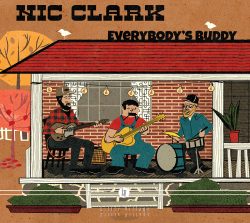Highly personal, intimate songs played with sensitivity and swing, with near-perfect warmth in the production.
 One name stood out when the email for this release popped up recently. Charlie Hunter is best known in the jazz world for his extraordinary playing on 7 and 8-string guitars. It would have been quite easy for Clark to be reduced to being a sideman on his own album with such a distinctive stylist along for the ride, but it’s his personality that shines through the songs.
One name stood out when the email for this release popped up recently. Charlie Hunter is best known in the jazz world for his extraordinary playing on 7 and 8-string guitars. It would have been quite easy for Clark to be reduced to being a sideman on his own album with such a distinctive stylist along for the ride, but it’s his personality that shines through the songs.
Those songs are born of his own life experiences, including battling eating disorders as a child. He says, “My experience is very common in America. I work an Amazon warehouse job, and I’m really ashamed of it. As a working musician, I need to make ends meet. Take one shift at an Amazon warehouse and you’ll understand how everyone has the same problems as you. People are in recovery, supporting multi-generational families, etc. I’m just so grateful I have my music to keep me out of trouble”. Taking life events that most people will recognise and doing something new with them in song is a challenge many bigger names have failed to live up to. Here Clark takes ‘It’ll Be Alright’ to reflect on the passing of his grandma, and ‘Try To Understand’ to examine writing off two cars when he was 21 and 23 years-old. “It’s all about moving on and living life with compassion for yourself, otherwise a self-hating voice will take over.” The infectious groove of ‘Try To Understand’ made it a natural for the lead single off the album.
‘Don’t Count Yourself Out’, which was advice to himself during the recording of the album, highlights the benefits that Hunter brings to the album. While Clark’s dobro and especially harmonica are dominant instrumental voices throughout, Hunter’s bass playing is what drives this tune along with a ferocious swing, and some neat guitar fills that along with drummer George Sluppick (Chris Robinson Brotherhood) provide a near-perfect backdrop for Clark’s bluesy voice.
‘How I Met The Blues’, about the death of Clark’s cousin and written at age 11 is inevitably a darker tune. While the album is built on a blues foundation this is the most overtly blues song here. You can imagine Buddy Guy or Otis Rush having covered it. Clark’s considerable harmonica chops are shown off to great effect as well. As the album progresses the acoustic side of his music takes centre stage with pedal steel from DaShawn Hickman on ‘Flying Blind’, underlining a tale of struggling at school.
The title song is a country-style song with what sounds like a mix of more pedal steel and some of Hunter’s trademark stinging lead lines. That positive song that takes pleasure in friendship, is followed by closing tune. ‘Breathe Slow’ which talks about having a panic attack while driving.
The production that Charlie Hunter has given Clark, puts his songs at the centre of the album, he doesn’t overplay, allows plenty of space for the tunes to breathe and while his own musical contributions, on bass especially, are key to the success of some of the more up-tempo tunes he never gets in the way and Nic Clark emerges as the star of this fine album.


